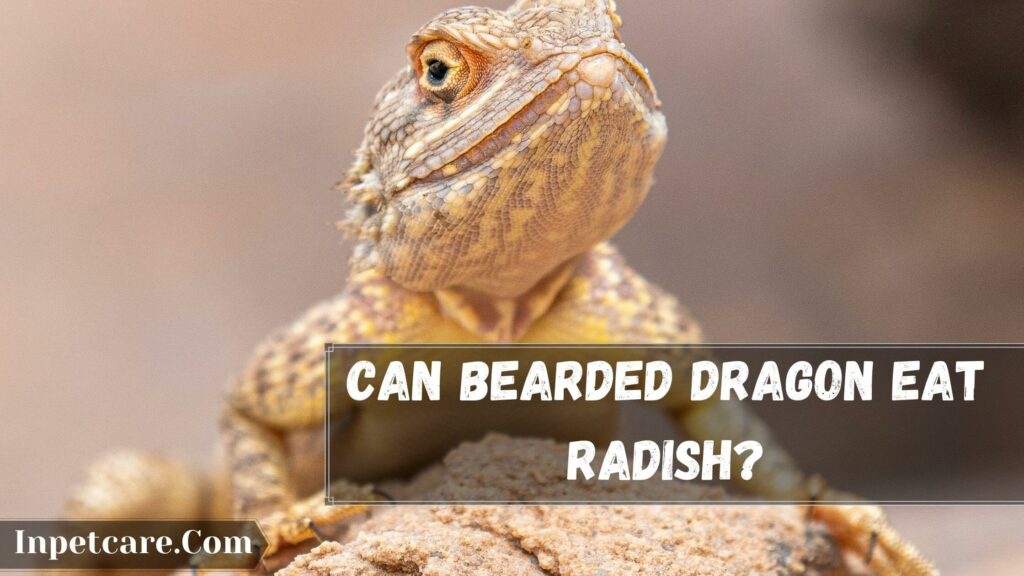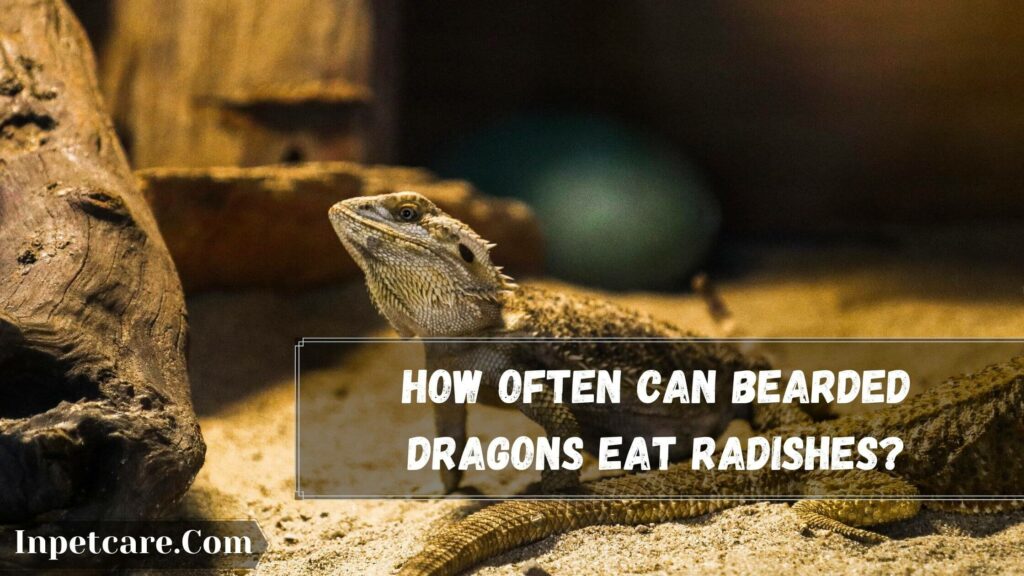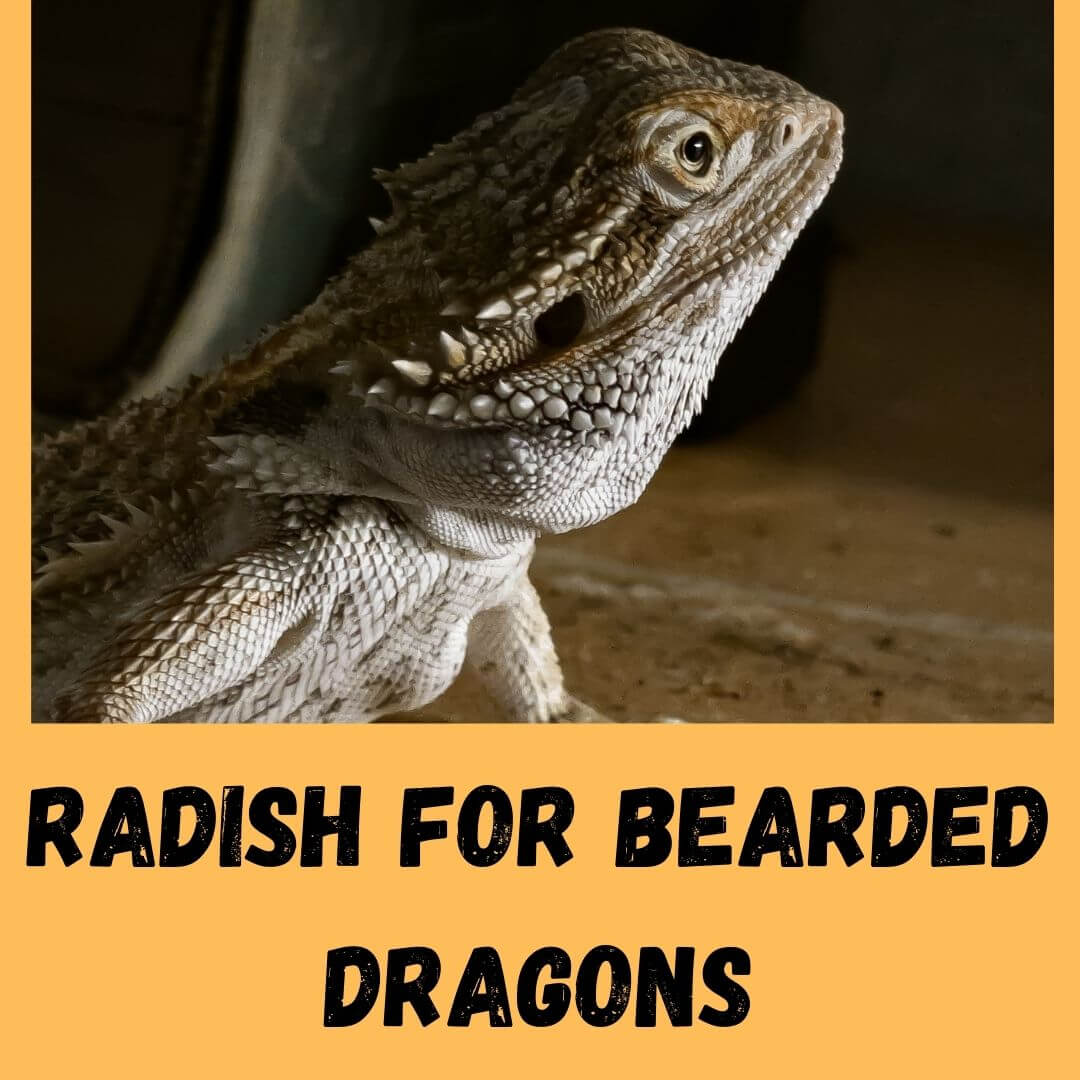If you’re looking for a veggie that can be served as an option in a mixed diet of a bearded dragon, then you might be looking at Radish. You might be wondering if beardies can have Radish. Being responsible reptile owners, we should always pay close attention to what our bearded Dragon eats.
Bearded dragons need a varied diet; you should be cautious about what you include in their serving every time. Like humans, bearded dragons can also get bored of eating the same food daily.
Thankfully, in this post, you’ll find your answer to the question: Can Bearded Dragons Eat Radish? Being highly nutritious, Radish belongs to the Brassicaceae family. Let’s know what part of Radish beardies can eat and what portion.
Post Contents
- Can Bearded Dragons Eat Radish?
- Why Are Radish Good For Bearded Dragons?
- Can Bearded Dragons Eat All Kinds Of Radish?
- How To Serve Radish To Bearded Dragons?
- How Often Can Bearded Dragons Eat Radishes?
- Can Bearded Dragons Eat Radish Leave?
- Can Bearded Dragons Eat Radish Sprouts?
- Can Bearded Dragons Eat Radish Leave?
- FAQ
- Conclusion.
Can Bearded Dragons Eat Radish?

Yes. Bearded dragons can eat Radish as long as it is served as part of their diet, not as a staple diet. Feeding an excessive amount of Radish will lead beardies to constipation. Since radishes are edible for reptiles like beardies, it is best to offer them in summer.
On hot days, Radish can be served as a source of hydration. Apart from being high in water level, it is rich in vitamins: Vitamin b-6, vitamin k and vitamin care. Besides vitamins, Radish is also rich in magnesium, fibre, iron and calcium.
Adult beardies need a healthy organic diet consisting of 80% plants and 20% insects in their regular servings. And Radish is a safe option in that 80%. Fortunately, Radish is more calcium than phosphorus, making it suitable for beardies to absorb calcium.
Many bearded dragons enjoy munching on these white roots. No matter how much your bearded Dragon likes and enjoys this veggie, it would help if you always were cautious with the quantity you offer to them at a time.
It would help if you never provided Radish more than six times a month. When it comes to their other parts, keep it only two times a month. Let’s know why Radish suitable for bearded dragons are.
Interesting Further Reading
- Bearded Dragon Brumation – A Complete Guide (With Photos)
- What to Feed Bearded Dragon Baby? – Proper Diet Plan
- Bearded Dragon Hiccups: 3 Reasons+ 4 Solutions
Why Are Radish Good For Bearded Dragons?
First of all, minerals and vitamins like Vitamin B-6, K & C, help im your beardie’s body proper functioning. As it can provide a reasonable amount of vitamins, it’s a good root veggie. These vitamins will help your bearded Dragon to maintain its healthy skin and immune system.
Apart from vitamins, magnesium in radishes helps you beardies’ nerve function, hormonal balance and skeletal development. Being high in fibre, Radish also enhances a bearded dragon’s digestive system’s proper functioning by allowing adequate water absorption from foods.
All in all, it supports smooth digestion. Calcium plays a crucial role in the development of their growth and bones. Since Radish is high in calcium, it will have positive effects on your beardies.
Can Bearded Dragons Eat All Kinds Of Radish?
Suppose you’re wondering whether baby carrots are okay for your Dragon. Baby carrots aren’t entirely off the menu for your beardie, but it needs to be prepared before being served.
Most baby carrots carry harmful preservatives, so wait 2-3 times before offering one to your beardies. Apart from these, beardies can eat radish colours. Whether it’s yellow, orange, white, or purple, they only look different but carry the same nutritional properties.
How To Serve Radish To Bearded Dragons?
Raw or cooked, both are suitable for feeding a beardie as long as it’s moderate. Keep in mind that cooked radishes often lose some nutrients compared to raw ones.
You should avoid chopping the Radish because it can still cause choking. It is best to offer Radish in mashed form. Make sure you wash it more than twice, as single cleansing doesn’t wash all germs, pesticides, or additives.
How Often Can Bearded Dragons Eat Radishes?

It would be best to never offer Radish more than twice a week to any adult beardie. For baby beardies, obliterate this. Feeding Radish too often or Too much can lead your bearded Dragon to diarrhoea.
100 g of Radish contains almost 95 grams of water with only small amounts of calcium ranging from 25 mg to 100mg. If you think that feeding Radish to bearded dragons will provide them with lots of calcium, you’re wrong. Feeding daily can hurt their health.
Can Bearded Dragons Eat Radish Leave?
Yes, but not more than twice a month. Radish green or its shoots contain oxalates, which are similar to phosphorus. Thus, it also prevents your beardies from absorbing calcium into their bloodstream.
If you have given some radish green, then don’t be worried, and it isn’t going to cause any problems. Bearded dragons can eat radish greens in small quantities, and too many gardens can cause metabolic bone disease and kidney stones.
Can Bearded Dragons Eat Radish Sprouts?
Yes, radish sprouts can be given to bearded dragons, and it is healthy and very nutritional. However, rather than feeding radish sprouts, you should offer Brussel sprouts.
Can Bearded Dragons Eat Radish Leave?
Yes. Bearded dragons can eat radish leaves but only in tiny amounts. Too much of it can interfere with calcium absorption capabilities.
FAQ
Conclusion.
Therefore, beardies can eat and enjoy the Radish in moderation. Its sprouts, tops or shoots should be avoided. Other parts of Radish contain oxalate, which can interfere with calcium absorption in your beardie’s body. No matter what colour or variety it is, all sorts of Radish are edible for beardies to have.
I tried my best to give you all the information around the question, can bearded Dragons eat Radish and its other parts. If you find this article helpful, consider sharing this piece with others, as it can be beneficial for some newbies who are new to keeping reptiles.
If you have any questions regarding bearded Dragon, don’t hesitate to comment below or mail us. I hope you will also check our other articles on bearded Dragon and its care. See you in the other piece, till then take care and bye.

94% of pet owners say their animal pal makes them smile more than once a day. In 2007, I realized that I was made for saving Animals. My father is a Vet, and I think every pet deserves one. I started this blog, “InPetCare”, in 2019 with my father to enlighten a wider audience.
